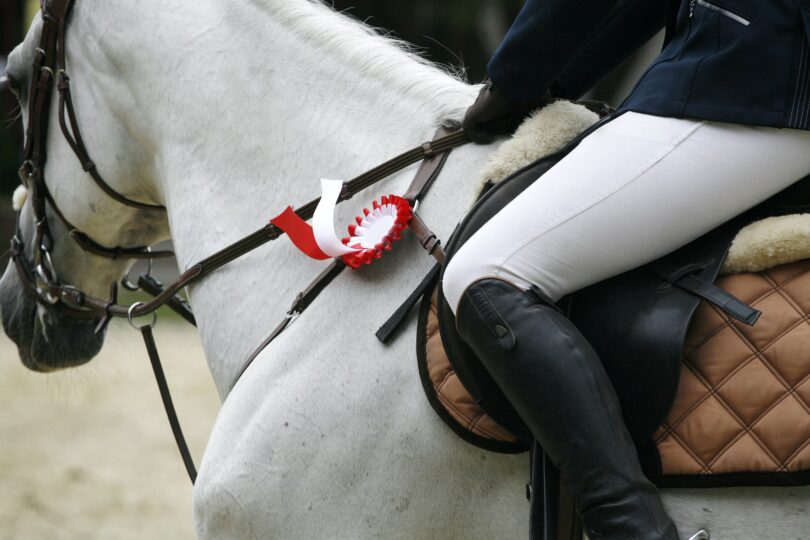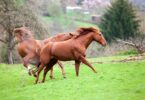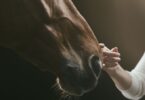As dressage riders we have all had that experience of going into the ring and feeling like we rode an awesome test, only to receive our test sheets and be disappointed with the score.
Sometimes it may be that what we were feeling and what the judges saw were two different things, but there are other factors at play in this situation.

I tried to explain this issue to my non-horsey partner, after experiencing this very phenomenon last year. His response was rather wise and thoughtful. He reminded me that the judge can only mark what they see on the day and that they have no idea just how far you have come. Our coaches have probably all told us something similar to the first part of this idea. The second part really made me think.
Today, I went out to a local, unofficial club competition and rode an elementary test for a 65%, the same score I received for this test when we last rode it about 6 weeks ago (the same weekend that I had my first medium start). I was happy enough with this score, although parts of today’s test felt far better. I quickly realised that there were a few things this score didn’t show. For instance, that I have recently had to ride through some really sticky stuff with Nonie. She has decided that it would be far easier if I carried her around the ring. The score also doesn’t show that this time I didn’t have my mum there to warm me up.
I also think its important to consider that while there are judging guidelines, the reality is that things will always be a little murky when humans are involved. While some judges may score on the generous side, some will be sticklers for correctness marking in a more conservative manner and others may find some things inexcusable and mark accordingly. It may in fact be very misleading to compare scores from different judges.
I often find that while the scores may vary the comments are usually fairly accurate. I always take time to read and understand the comments. Its helpful to consider these comments. Do they come up regularly? If so do these comments speak to a larger issue? Can you develop some goals around these and incorporate them into your training plan. Take time to recognise the progress that you have made. But most importantly never allow one score or even two or three to define your riding.








Definitely some food for thought in this article, very well written. Something I believe that should be added to this train of thought, is with the judges own qualifications and training, and whether they are experienced enough in the discipline (even in local unofficial) to be even providing a fair score of a movement, that credits both the horse and rider, as a standard, and not by just “what they think”, “who they know” or what “looks good”. As mentioned above, there is a lot more to a discipline than meets the eye, including years of training and preparation, just to be met with an uneducated guess of a score by a breeze through judge. In this discussion, my input is that the judge needs to be just as experienced with years of training, just like the competing team.
On another note, you pair a dream to watch, and look forward to seeing you compete next ❤
Indeed dressage scoring is highly subjective – it depends entirely on the judge’s interpretation of what they see in that moment (like your partner says). I think one of the key things to support any dressage score is to place it in context to the rest of the class. A 65% might not feel like you have been rewarded correctly, but if the winner was on 67% and the lowest was 50%, you’ve done quite well, and vice versa for when you think you’ve had a bit of a lucky score!
Indeed dressage scoring is highly subjective – it depends entirely on the judge’s interpretation of what they see in that moment (like your partner says). I think one of the key things to support any dressage score is to place it in context to the rest of the class. A 65% might not feel like you have been rewarded correctly, but if the winner was on 67% and the lowest was 50%, you’ve done quite well, and vice versa for when you think you’ve had a bit of a lucky score!
That’s such a great point Sophie!
I probably used a bad example as I felt like he 65% was fair (and to be honest I was pretty happy with that for an elementary test), but I think/hope my point comes across.
Take the score as one piece of information, don’t make it the be all and end all.
This is so true, not even just in the dressage ring. I ride mostly young horses and whether I’m jumping, riding a dressage test, or showing a sales horse, my horse gets judged on THAT day. No one gets to see the journey and the progress each horse has made except me and my trainers and barn mates. This is why I’ve decided to start documenting everything. Because what I’m most proud of is the progress my horses have made, as well as my own progress as a rider/trainer, and I want the world to see and hopefully inspire anyone who is struggling to just keep on treking!
This is so true, not even just in the dressage ring. I ride mostly young horses and whether I’m jumping, riding a dressage test, or showing a sales horse, my horse gets judged on THAT day. No one gets to see the journey and the progress each horse has made except me and my trainers and barn mates. This is why I’ve decided to start documenting everything. Because what I’m most proud of is the progress my horses have made, as well as my own progress as a rider/trainer, and I want the world to see and hopefully inspire anyone who is struggling to just keep on treking!
Wow, I had no idea! Good to know!
I’ve stopped looking at scores as much nowadays compared to when I was younger as in my late teens I realised that it’s all to do with how you feel it went!
I confess dressage scores are a mystery to me, probably because I’ve never competed in it! Jumpers are simple and cross country seem pretty straightforward to me. I’ve competed in Hunters and the judging seems a bit murky as well so it took me awhile to understand the system. Each judge has there own pet peeves and things they look for, so if you have ridden for a judge before I think that certainly helps. But in hunters here in the US you do not receive a copy of the judge’s comments or your score. It’s a bit like riding blind.
I was a dean at a boarding school with a well known riding program. It’s serious business! We had girls who flew to Wellington every weekend. Good for you!